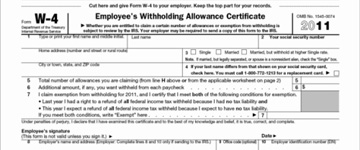How Short Sales and Foreclosures Affect Your Taxes

If you're like most people, the purchase of a home is probably one of the biggest financial decisions you will ever make. But sometimes, circumstances beyond your control may require you to sell the home in a short sale or cause you to lose your house to foreclosure. Watch this video to learn more about how a short sale or foreclosure may affect your taxes.
Whenever you sell a home, you need to calculate your capital gains to determine whether you owe any tax. If you engage in a short sale or your mortgage lender forecloses on your home, the Internal Revenue Service treats it just like a sale. Foreclosures and short sales may also require you to recognize ordinary income if the lender cancels any of your outstanding mortgage balance and you’re ineligible for an exclusion.
Short sales and foreclosures
A short sale or foreclosure is usually the result of a borrower’s inability to continue making mortgage payments. In a short sale, your mortgage lender allows you to sell the home for less than your outstanding loan balance and cancels your obligation to repay any remaining loan balance. With a foreclosure, the mortgage lender will take possession of the home if the lender doesn’t receive scheduled mortgage payments over an extended period of time. Also, in many cases, the lender cancels your outstanding mortgage balance. Sometimes, this debt cancellation is taxable as ordinary income.
Tax on foreclosures
When your foreclosure includes a cancellation of debt, you only have an obligation to report it as ordinary income if you were personally liable for the entire mortgage, despite the security interest your lender takes in the home. This amount will be reported in Box 2 of the 1099-C form that the lender will send you.
You also need to calculate the capital gain that results from the foreclosure. To calculate the gain, subtract your tax basis in the home — generally the purchase price plus the cost of home improvements you make — from the home’s fair market value. However, if you’re not personally liable for debt that remains, use the outstanding mortgage balance at the time of foreclosure instead of the home’s fair market value.
Gain on short sales
Similar to a foreclosure, any debt that your mortgage lender cancels because of a short sale is taxable only if the terms of your mortgage hold you personally liable for the full amount of the loan. Regardless of the tax consequences, your lender will report the debt cancellation on a 1099-C form.
For example, if you owe $500,000 to your mortgage lender and short-sale the home for $450,000, your lender will report $50,000 of canceled debt on your 1099-C. Since most mortgage lenders wouldn’t agree to a short sale if the value of the home exceeds the outstanding mortgage balance, no capital gains issues exist.
Possible exclusions
You may be eligible to exclude canceled debt from your tax return if it relates to qualified principal residence indebtedness. This covers all mortgages you obtain to buy, build or substantially improve a home and for which the lender retains an interest in the home until it’s paid off. You may also be able to exclude the capital gains. If you lived in the home and were the owner for a total of two years during the most recent five-year period, you can exclude up to $250,000 of the capital gains or up to $500,000, if filing jointly, in some cases.
When you use TurboTax to prepare your tax return, we will ask you simple questions and help you determine whether you qualify for any exceptions or exclusions. We’ll also handle all the calculations and fill in all the right tax forms for you.
Tax Tips After January 1, 2013
TurboTax gives you 10 tax-saving tips for the new year. Find strategies to lower taxes, save money when preparing your tax return and avoid tax penalties.
5 Life Changes That Should Make You Revisit Your W-4 Withholding
Some life events result in more taxes, while others entitle you to credits and deductions that lower your taxes.

